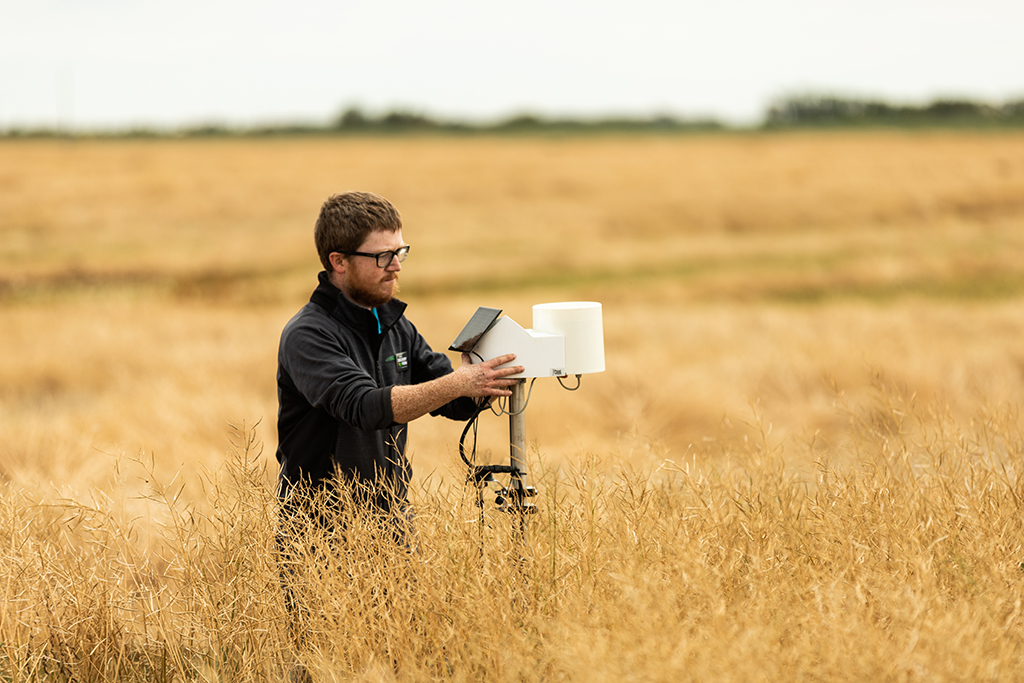
USask researcher evaluates agricultural management practices to optimize nutrient and water use across Saskatchewan landscapes
Blake Weiseth is studying the impact of fertilizer and cropping management practices on phosphorus and nitrogen, evaluating use efficiency and nutrient loss in runoff water in variable topographies of Saskatchewan.
By Kira Glasscock“Agricultural management strategies that promote nutrient and water use efficiency are win-win situations for society at large,” said Weiseth, a PhD student in the University of Saskatchewan (USask) College of Agriculture and Bioresources. “Judicious fertilizer use leads to greater production with less resources, and with less potential negative environmental impact.”
Improved agricultural water management practices would provide producers a way to optimize farming productivity by limiting nutrient loss in runoff water which can have negative water quality impacts, said Weiseth.
“When surface water bodies receive runoff water enriched in nutrients, it can lead to eutrophication and explosive growth of algae can occur. This has negative aesthetic and water quality impacts.”
The work is supervised by Dr. Jeff Schoenau (PhD), Saskatchewan Ministry of Agriculture Strategic Research Program Chair in Soil Nutrient Management in the Department of Soil Science, and Dr. Jane Elliot (PhD), a research scientist with Environment and Climate Change Canada.
The project will also help determine which soil, cropping and fertilizer management practices are most effective for different soil and landscape characteristics.
“The performance of these management practices will be evaluated across different topographic positions and soil characteristics that tend to manifest in the hummocky landscapes of the Canadian Prairies,” said Weiseth.
Research trials are being conducted at Discovery Farm near Langham, Sask., and a farm field site near Central Butte, Sask. Crop, soil, and runoff water samples from small plot and landscape-scale trials will be collected and analyzed to trace the applied nutrients through the soil-plant-runoff water system.
One management practice Weiseth is evaluating is variable-rate fertilizer application.
“After only a single field season (2021), variable-rate fertilizer application was shown to be an effective management practice to promote nutrient use efficiency. Acceptable crop yields were maintained in this treatment despite reduced fertilizer application relative to the control treatment by making use of residual soil nutrients in low lying areas of the landscape. Implementation of this treatment also resulted in reduced dissolved phosphorus losses in runoff water relative to the control.”
Data collection for this study will continue for 2022 and 2023.
With both drought and localized flooding common conditions for the Canadian Prairie, methods to optimize water and nutrient use efficiency to mitigate environmental impact would benefit most Saskatchewan farmers.
Water has a tremendous impact on nutrient use efficiency and environmental conditions can vary drastically both over subsequent growing seasons and within a given field over the course of a single season, said Weiseth.
“Soil analysis combined with technologies such as soil mapping and Digital Elevation Models allow us a greater ability to measure and understand this variability than ever before. This in turn allows us to apply targeted use of management practices. Research is needed, however, to provide the initial validation of these practices for their effectiveness in achieving their intended goal.”
“Our existence as a society is dependent on our ability to sustainably manage soils,” said Weiseth, who completed his undergraduate (BSA’13) and master’s degrees (MSc’15) at USask.
“Both in Canada and globally, the negative effects of nutrient loss have been seen. There is no better place to study to meet this challenge than an institution with world-class faculty and facilities.”
This research is supported by the Saskatchewan Wheat Development Commission, Saskatchewan Pulse Growers, Saskatchewan Canola Development Commission, Western Grains Research Foundation, Foundation for Agronomic Research, Water Security Agency, Saskatchewan Soil Conservation Association, Saskatchewan Stock Growers Association, and Saskatchewan's Agriculture Development Fund.

